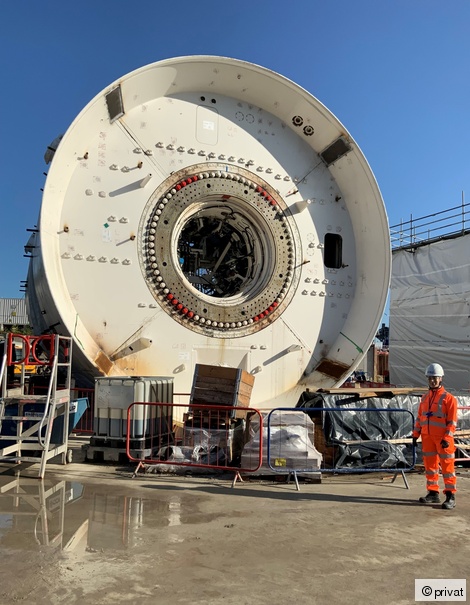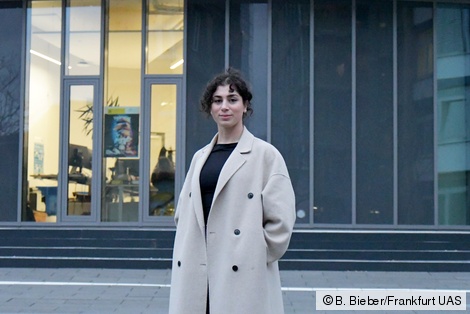Civil engineering student Leyla Paksoy completes practical semester in London on Europe's largest infrastructure project HS2
The construction of the High Speed 2 (HS2) line in the UK is considered Europe's largest infrastructure project. Being involved in this mega project as a civil engineer is certainly one of the most impressive professional experiences. Leyla Paksoy can confirm this. The 23-year-old is studying civil engineering in her 7th semester at the Frankfurt University of Applied Sciences (Frankfurt UAS) and recently returned from London, where she completed a practical semester (BPS) on the HS2 tunnel construction site. The route from London's Euston Station to Birmingham, which is mainly planned to be underground, will one day see trains roaring along at speeds of up to 360 kilometers per hour.
The student had already moved to London in April to discover the city and improve her language skills, and in May she started her internship, which she completed as an employee of STRABAG UK Ltd for the Skanska, Costain, STRABAG consortium (ARGE). She was based in London at the Victoria Road Crossover Box (VRCB), where trains will change tracks underground in the future. "We built the tunnel boring machine together for the Northolt Tunnel East, which then bores from VRCB to Greenpark Way Shaft," reports Leyla Paksoy. "My job was to do the site report on the assembly of the tunnel boring machine." During mechanized tunnel construction, a gap is created between the tunnel lining and the ground, which is grouted with mortar. "I also had the task of compiling all the information about which manufacturer and mixing ratio the consortium is now clearly using and writing a paper about it." She was also involved in the team's general work assignments.
Leyla Paksoy knew early on that she wanted to become a civil engineer. "Before I started my studies, I did an internship at the engineering office for structure+strength at Conrad Hansen in my home town of Kiel. It was during this internship that I first became fascinated by civil engineering. From that moment on, it was clear to me that I saw myself in this field," she says.
The fact that she has now spent her practical semester abroad was a special experience. "Frankfurt is home to major construction companies and has plenty of building sites," she says, "so there's plenty of choice for students in the BPS." This is not least due to the good contacts of many professors in the Civil Engineering teaching unit at Frankfurt UAS, who come from the field. This includes Prof. Dr.-Ing. Steffen Leppla, Professor of Geotechnics at Frankfurt UAS, who supervises Leyla Paksoy during her studies.
The fact that an internship abroad is more time-consuming did not deter the budding civil engineer at all. "I had already been a working student at the construction company Züblin for almost two years. Through my work there, I was able to get in touch with STRABAG UK. I forwarded my application to them and was accepted." Prof. Leppla was able to see for himself that his student was well integrated into the local team: "During a construction site visit in London, I was able to see for myself that Ms. Paksoy is doing a really great job on an extraordinary project."
Her assignment in the British capital left a lasting impression on the student. As one of 103 women in a team of 1,123 employees, she had the positive experience that the only thing that counts is know-how. "This was the first time I had worked in tunnel construction - and then on this scale. I was able to get to know a completely new field of civil engineering with very competent colleagues who always took the time to explain tunnel construction to me in more detail," reports Paksoy. "For me personally, my greatest experience was when I was allowed on the tunnel boring machine (TBM) in West Ruislip, Northolt Tunnel East. To see that the TBM works like a small factory underground is very fascinating. And to realize that one day the fastest trains in the world will run here really impressed me!"
HS2 will connect London and Birmingham over a length of 225 kilometers. The news that the British government recently announced a construction freeze for the second section from Birmingham to Manchester for cost reasons does not dampen the great practical experience. Back in Germany, Leyla Paksoy is continuing her studies at Frankfurt UAS and is expected to complete her Bachelor's degree in three semesters. "I have the opportunity to do my Bachelor's thesis with the HS2 project. After completing the final modules, I can then work with STRABAG UK again."


